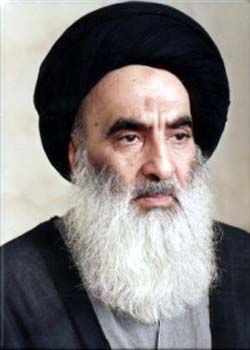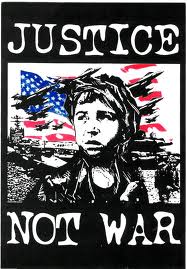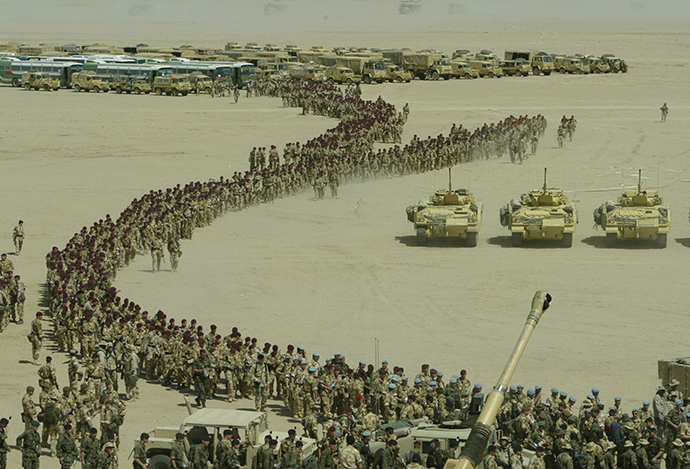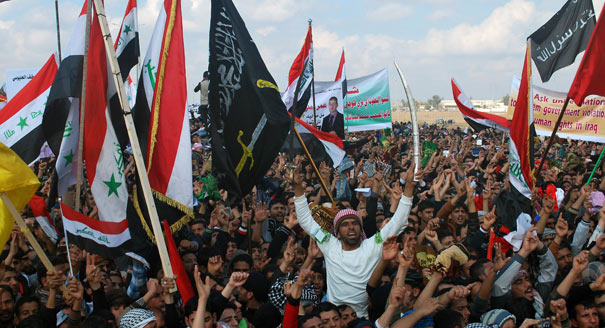The religious duty of a Muslim leader is to oppose the invasion of his land which would inevitably result in killing and destruction, both of which should not be condoned by a Muslim.

Ali As-Sistani, the most influential Shi’a cleric, recently issued one of the most controversial and contentious Fatwas that may have far more repercussions than ever thought. Although several attempts have since been made to moderate the language and purpose of that Fatwa, the damage had already been done. The ‘Jihad Fatwa’ called on able Shi’a men to take arms and fight the attack of Sunni Selafis against the Government in advancing from Mousil south towards Baghdad. The Fatwa has created a polarization the like of which Iraq has never experienced before as waves of Shi’a mob took arms and marched through cities in Iraq intimidating Sunnis. But in order to understand the value of the Fatwa and its possible repercussion, a few words need to be said about the meaning of Shi’a hierarchy. The following are excerpts from our forthcoming book, Genocide in Iraq II, to be published by Clarity Press Inc in December 2014.
“Muslims generally have never had a religious hierarchy akin to the Christian church. The Shi’a religious hierarchy is a recent creation in Shi’a history. In the times of the Imam, the source of guidance was the Imams themselves. This remained the case even when Shi’a theology was being formulated after the twelve Imams. However, in the last two hundred years a new concept was born. Both ‘Taqleed’ and ‘Marji’yah’[i]came into use as terms of specific meaning in Shi’a theology. ‘Marji’yah’ came to mean the religious reference to which every Shi’a should accept and seek advice from. ‘Taqleed’ is the responsibility of each Shi’a to select a religious learned person (Faqih), who has been certified by his fellow learned colleagues as having reached the stage of the capacity to interpret (ijtihad), and follow him blindly.
Each Shi’a was taught that he/she should choose one such religious leader as a Marji’ and follow him in ‘taqleed’ which entailed following his edicts; seeking his opinion in all matters of religion and life and paying the alms of 20% of their income. Once they do that, they are assured that they will be absolved of any sin having followed the opinion of the Marji’.
There are two important consequences to such a practice. Firstly, it killed all capacity to have an independent thinking by removing the duty on a human being to use his reasoning in matters of life, which is a very reactionary step even for Islam. Ijtihad (independent reasoning or the making of a decision by a personal effort) which the Shi’a had taken pride in over centuries while they retained it, has been made the exclusive right of the Marij’ and not the individual. Secondly, it created such a power to the Marji’, who could rely on vast sums of money through the payment of alms over the strong and widespread following. When we consider that this taqleed for any one Marji’ takes place across borders, we can see the potential of the power base of such a Marji’ if he amasses a large following in the Muslim world. It would make it easy to see how a simple Marji’, like Abul-Qasim Al-Khoei’ [ii], while in Najaf of Iraq, managed to set up a charity with an initial capital of some 700 million pounds and register it in his son’s name. Such potential of power has never been available to any ruler or leaders in the world. The difference between such power and that of a political dictator is that for the latter the people generally go along with following him for different reasons whether it was coercion or compulsion, while the Marji’s people follow him believingly. The Marji’ relies on apparatus that does not even exist for political leaders. He uses existing mosques in which he appoints his representatives who carry out the duty of passing on his opinions and forwarding questions put to him by his followers. His source of authority is the undisputed Qur’an which he interprets as the point of reference for an authority he claims to derive from the Imam Mahdi whose expected return would deliver salvation to his hapless masses.
It is in the light of this reality that politics in Iraq, and to a similar extent in Iran, should be understood.
The power and significance of Marji’yah in Iraq could be understood if we consider two instances in its history, namely following the two invasions of Iraq in 1916 and 2003. Despite feeling persecuted by the Ottoman rule, the Marji’yah in 1916 refused to side with the British invaders. It opposed the invasion; issued ‘fatwas’ for that; called on Iraqis to take up arms and fight it and in some cases took part personally in the resistance against the invasion [iii]. However, in 2003, and for the reasons that we shall elaborate, the Marji’yah was either openly in support of the invasion or at best silently acquiescing in it, both of which is, in our opinion, sacrilege.
Despite the domination of Sunni over all Governments in Iraq between 1920 and 2003, it is fair to say that none of them was in principle sectarian with intent. But that did not lessen the grievance and sense of injustice which the Shi’a intelligentsia felt during these years. The sectarian identity of an individual is a very complex issue to figure out. We have had friends from both Shi’a and Sunni over the years who had in general acted with indifference to the sect of each other. However, at times of crisis or when there is some conflict between the sects, these hidden identities seem to surface and rational people suddenly become irrational. This has been more evident in recent weeks since the incursion of ISIS forces into Mosul and neighboring areas in writings and comments on Facebook and other outlets. It is beyond our competence to understand such affiliation and how it functions but we can observe it and comment on it.
The sense of injustice among the majority of the Shi’a of Iraq has become so ingrained in the culture and psyche that, when it comes to issues of principles, it seems to subconsciously affect even educated Shi’a and obscure their vision. This has slowly become a sense of victimization which cuts through all strata of the Shi’a in Iraq and has worked to alienate most of them away from Arab Nationalism. Although some staunch Nationalists[iv] were Shi’a, the majority shied away from identifying themselves with it. The reason may not be too obvious to notice. We believe that most Iraqi Shi’as were brought up being told that because the main persecution came from the Sunni Ottoman rule and because most Arabs around Iraq are Sunnis, then any unity with them would make the Shi’a an even smaller minority and thus the persecution would continue. They became, whether consciously or subconsciously, opposed to the idea of Arab Nationalism and Arab unity that follows from it. This led to the result that the Arab Nationalist movement in Iraq has had a mainly Sunni character. This result created a vicious circle as young Shi’a were reminded of the Sunni nature of Arab Nationalism which alienated them even further! This may also explain why young Iraqi Shi’a turned to communism! It would be interesting for any study to compare the situation of the Shi’a in Lebanon with the Shi’a in Iraq and find out the reason for the former being so much more in the Arab Nationalist circle than the latter.
The Americans and the British, relying on an army of Orientalists led by Bernard Lewis, hundreds of think tanks, numerous Iraqi experts and a plethora of intelligence reports, concluded mainly post WWII that by appealing to the sense of injustice among the Shi’a of Iraq, they could subdue Iraq and maintain the purpose of Sykes-Picot. Having realized that the Marji’yah wielded more power than any political party, they concluded that the best way to control Iraq was to infiltrate the Marji’yah and either control it or influence it. As the Marji’ was so powerful, he was all that was needed to persuade Shi’a, directly or through an influential member of his inner circle, that the imperialists’ ambitions were not anti-Shi’a. The offer would be very simple: Be on our side and we will deliver Iraq to you!
The strategy to infiltrate the Marji’ never slowed down. It simply had to adjust within the realities of politics in Iraq depending on whether or not the regime was fully antagonistic to imperialists’ design. Thus when Iraq was serving their interests in fighting Iran, the imperialists eased their pressure on it and encouraged closer links between Baghdad and one of the most powerful Marji’s in 20th century Shi’a history, Abul-Qasim Al-Khoei’. They even suggested to their rich Shi’a friends in the Gulf to pay their alms to Al-Khoei’ in Najaf rather than Khomeini in Iran. The situation suddenly changed when Iraq retook Kuwait in 1990. The imperialists embarked on an intensive campaign to influence theMarji’yah which took many different forms ranging from contacts with rich Shi’a all over the world, to setting up religious centres, to recruiting people to work in the media, all to serve one purpose; namely to convince the Shi’a masses of Iraq that there would be salvation in ousting the Ba’ath rule. The success of the campaign materialized from its early days after the attack on Iraq in 1991. The Marji’yah established its authority when Saddam Hussein felt unable to act against Al-Khoei’ after the latter refused to back his crackdown on the uprising that followed the 1991 military attack
The planners in Washington and London carried on the infiltration of the Marji’yah ensuring that both Al-Khoei’ and As-Sisatni, his natural successor, were being constantly persuaded. Along with these tactics with the Marji’yah, the imperialists opened channels of communications with all known Shi’a parties ranging from The Supreme Council of the Islamic Revolution in Iraq (SCIRI) stationed in Tehran and led by one of Al-Hakims’s sons, to the Da’wa Party through its representative in London, Ibrahim Al-Ja’fari, who became a Prime Minster after the invasion, and who was in constant contacts with MI6.
In attempting to justify collaborating with the Zionists, some Shi’a went down a very serious line of argument in which they debased Islam in general and Shi’ism in particular. One such measure was to fabricate a Hadith, which is not completely new in Islam, as it is awash with fabricated Hadiths, to justify their collaboration with the Zionist against Muslim Iraq. The fabricated Hadith is supposed to say:
The rule of a just heathen ruler is better than the rule of an unjust Muslim ruler.
This they argued was the reason for them to invite the Zionist to invade Iraq, as it would get rid of the unjust rule of Saddam Hussein and replace it with the just rule of the Marji’yah. But they got George Bush! We have yet to come across one Shi’a writer who has asked why, in view of this powerful Hadith, did not their Fourth Imam, Ali Bin Hussein, collaborate with the Byzantines and invite them to occupy Syria and oust Yazid Bin Mu’awyiha, who had massacred his father Hussein and all his family. Indeed, if anything, Ali bin Hussein in all his sermons had called for the defence of the Muslim land.
The religious duty of a Muslim leader is to oppose the invasion of his land which would inevitably result in killing and destruction, both of which should not be condoned by a Muslim. However, when the missiles started showering Iraq in March 2003, Ali As-Sistani, who we believe had prior advice of the invasion, kept quiet. His silence, which naturally would have been watched by the millions who followed him, meant that they either supported the invasion or acquiesced in it. There are millions in Iraq and outside it who follow As-Sistani. The invaders could not have wished for a more favourable state of affairs. As-Sistani’s silence delivered to them a victory that no missiles could have achieved. Some may argue that as a religious leader he had to keep out of politics. But the protection of the Muslim Umma is a religious duty. As-Sistani did not do what the Shi’a leaders did in 1916 in calling on the people of Iraq to fight the infidel army invading their Muslim land.
It is no secret that As-Sistani has always opposed the concept of ‘Wilyat Al-Faqeeh’ [v] and all that Khomeini represented, even when he was in Najaf before he assumed power in Iran. The argument of As-Sistani and his ilk is that religion should keep out of politics which Khomeini and his followers suggest to be inseparable. The latter, on the other hand, believed that Islam and politics are inseparable because Islam is not just a religion but a way of life. But in reality As-Sistani and his followers have always been involved in politics, albeit covertly. There is overwhelming anecdotal evidence about the coordination between Bremer and As-Sistani and his entourage in Najaf, but we shall not go into that here. However, we shall cite a few examples of clear political deacons made by As-Sistani which goes to show that not only did he meddle in and influence politics in Iraq post-2003, but that he in fact supported the invasion and acquiesced in the changes introduced by the invaders in Iraq. It may be argued that As-Sistani did not oppose the invasion because he wanted to preserve life, given the US was going to occupy Iraq in any case and thus surrender was the best option to protect the lives of the Muslims. It may also be argued that As-Sistani wanted to keep out of politics and stick to his religious duties towards his followers.
Had he really kept out of politics, all these arguments would be reasonable. But in 2005 a new constitution for Iraq was drafted by the invaders. It seems that As-Sistani suddenly woke up and decided that every citizen, especially his followers who bestow ‘taqleed’ on him, should vote in favour of the Constitution. Could this be anything but a political act? There are rumours about ‘fatwas’ having been issued by As-Sistani to force his followers to do so. Whether or not such fatwas were indeed made is irrelevant so long as the people believed that they were made and the Marji’ did not come out publically and deny having made them. His silence was as good as having admitted to having made them. That intervention by As-Sistani was a clear support of the invasion for one simple reason. The new constitution included an article [vi] which stated that all the laws passed by Bremer would become irreversibly part of Iraq’s laws. By supporting the new constitution, As-Sistani agreed to legitimize the invasion and all its consequences. Had he even bothered to object to this article in the constitution we would have been able to find some justification for his intervention.
Many articles have been written in an attempt to exonerate As-Sistani from the charges levelled against him by his opponents from among the Shi’a of Iraq, like Muqtada As-Sadr [vii], that he had supported the invasion and collaborated with the occupiers. We do not find any of the arguments convincing. As-Sisatni had to choose either to keep out of politics completely or to get involved in it completely. He could not have it both ways and select to intervene at times and keep out of it at others. As we have shown above, by acting like that, As-Sistani served the interest of the imperialists in a way no military action could have achieved.
We have been told that part of the aim of the invasion was to introduce democracy to Iraq. We are not so naïve as to believe that the US/UK are so magnanimous to waste their sons and billions of dollars at times of need in order to democratize Iraq when they seem to be very happy with their favoured allies in Arabia and the Gulf representing the most despotic regimes on Earth. However, even if we were to go along and accept that democracy was indeed intended for Iraq, our main concern would be to ask: which democracy? In Iraq where four million people, including some of our well educated friends, went in 2005 to the polls to vote ‘Yes’ for the Constitution, without having even read it, simply because As-Sisatni ordered them to do so; the meaning of one man-one vote becomes hollow rhetoric and democracy loses its meaning. No despot could dream of such a deception becoming reality.
The Marji’yah is a double-edged sword. In 1916 it made life difficult for the British invaders. In 2003 it made life very easy for both American and British invaders. But in any case the Marji’yah in Shi’a Iran and Iraq wields more power than any political party or military act.”
It is in the light of the above short exposition that the new Jihad Fatwa, what is happening in Iraq and to where Iraq is heading, should be considered.
The latest claim by As-Sistani in which he expressed his fears that Iraq is heading towards disintegration in line with the Zionist’s plans, seems to be naïve to say the least. As-Sistani ought to read the 2005 Constitution which he vehemently backed in order to see the seeds of the division of Iraq having been sown. What is happening today of the fragmentation of Iraq was planned even before the invasion. If any of As-Sistani entourage would bother to read the classified documents already released on the 2001 Future for Iraq Project as set up by the Zionist US Government, he should advise his holiness accordingly.
The Jihad Fatwa reveals poor judgment and a lack of wisdom in a man who holds such a responsible position holding in his hands the lives of millions of people and should carefully watch any word or action. The Fatwa has opened As-Sistani to at least two major questions that need to be addressed.
- If Jihad is a religious duty on a Muslim to defend his people and land against an invasion, then where was As-Sistani when Iraq was invaded and occupied by the infidel Zionist army in 2003?
- If Sunni clerics were to meet tomorrow and call on Sunnis to come out in Jihad to defend their Sunni brethren under siege in Baghdad being intimidated by young gun-touting hooligans from Sadr city who have been unleashed by As-Sitani’s Fatwa, then millions of fanatic Sunnis from Indonesia to Morocco would gather over night in order to march across the borders of Arabia and Turkey leveling the holy shrines in Najaf, Kerbela, Sammara and Baghdad. How would As-Sistani react? Would not Hizbullah and its effort over the last twenty years fighting Israel go down the drain? Or is that part of the plan?
May Allah protect the people of Iraq from the dark bloody months awaiting them!
Abdul-Haq Al-Ani
29 June 2014
www.haqalani.com
[i] Marji’ means the source and the reference, while Taqleed means that people can, through a leash on the neck (Qiladah) of a learned jurist, follow him in order to have less responsibility in practising the complexities of their faith. See eg.: Kalantari, Mohammadreza, ‘Shiite Marja’iyat: The Association Of Shiite Quietism And Activism’, Paper prepared for delivery on the Panel, ‘Shi’ism: Clerical Authority, Identity and Diaspora’, at the BRISMES Annual Conference 2012, ‘Revolution and Revolt: Understanding the Forms and Causes of Change’; 26-28 March 2012, London School of Economics and Political Science (LSE)
http://brismes2012.files.wordpress.com/2012/02/mohammadreza-kalantari-shiite-marajaiyat.pdf
[ii] http://www.al-khoei.org/About/FounderPatron.aspx
[iii] Sayyid Muhammad Al-Haboobi declared Jihad against the British and led an army of 90 000 fighters in a fierce battle against the British army in Shu’aiba near Basrah in 1914
http://178.238.229.150/forum/showthread.php?t=101
See also: Al-Ghanimi, Basim Ahmad Hashim (2008) ‘The Role of Shi’a Clergy in Iraq’s Political Affairs 1900-1920, Part 1’,(in Arabic) Al-Furat Magazine, Issue 4, Al-Furat Center for Development and Strategic Studies, http://fcdrs.com/mag/issue-4.html
And: Askary, Hussein (14 November 2003) ‘Lessons to be learned: Iraqi Resistance to British Occupation 80 years ago’, Executive Intelligence Review, Volume 30, Number 44
http://www.larouchepub.com/other/2003/3044iraq_history.html
[iv] Like Fu’ad ar-Rikabi and Muhammad Mahdi Kubba and a few others.
[v] This is the basis of the constitution of the Islamic Republic of Iran. The term literally means “Guardianship of the Jurist” whereby Islamic law would be the rule of the land and one of the leading Islamic jurists (like Khomeini who was followed by Khamenei) the supreme ruler.
[vi] Article 126 of the Iraqi Constitution
http://portal.unesco.org/ci/en/files/20704/11332732681iraqi_constitution_en.pdf/iraqi_constitution_en.pdf
[vii] See: ‘Profile: Muqtada Sadr’ (19 January 2012), BBC News
http://www.bbc.co.uk/news/world-middle-east-12135160










